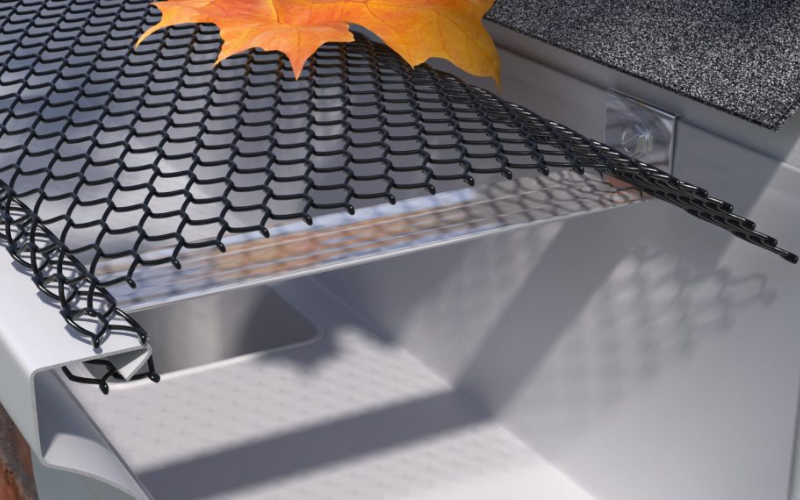
When it comes to protecting your home from water damage, gutters play an essential role. They channel rainwater away from your roof, walls, and foundation, preventing costly repairs. However, over time, gutters can become clogged with leaves, twigs, and other debris, which may lead to blockages and potential damage. This is where a gutter screen comes in. Gutter screens act as a protective barrier, ensuring that debris stays out of your gutters, allowing rainwater to flow freely. But with so many types of gutter screens available, how do you choose the right one for your home? In this guide, we’ll explore the different types of gutter screens and help you make an informed decision to ensure maximum efficiency.
What is a Gutter Screen?
A gutter screen is a mesh or perforated material installed over your gutters to keep out leaves, twigs, and other debris while allowing rainwater to flow through. These screens are designed to prevent clogs, reduce maintenance, and ensure the proper functioning of your gutters, even during heavy rainfall. There are several different types of gutter screens, each with unique features that cater to various needs.
Types of Gutter Screens
- Mesh Screens
Mesh screens are one of the most common types of gutter protection. Made from materials like aluminum or stainless steel, mesh screens feature small holes that allow water to pass through while blocking larger debris. Mesh screens are easy to install and provide an affordable option for homeowners looking for efficient gutter protection.
Pros:
-
- Easy to install.
- Affordable.
- Prevents most debris from entering the gutters.
Cons:
-
- Can get clogged with fine particles like dust and pollen.
- May require occasional cleaning.
- Reverse Curve Gutter Guards
Reverse curve gutter guards are designed with a unique shape that forces water to flow along the curve into the gutter while debris is directed over the edge. This type of gutter screen is more effective in areas with heavy rainfall or larger debris, such as pine needles or acorns.
Pros:
-
- Efficient in heavy rain.
- Keeps out large debris.
Cons:
-
- Can be expensive.
- Requires professional installation.
- Foam Gutter Guards
Foam gutter guards are made of dense, porous foam that fits directly into the gutter. The foam allows water to flow through while trapping debris on top. These gutter screens are easy to install and work well in areas with moderate to light debris accumulation.
Pros:
-
- Simple installation process.
- Affordable.
Cons:
-
- Can clog with fine debris.
- Needs regular maintenance to remove debris buildup on top of the foam.
- Perforated Metal Gutter Guards
Perforated metal gutter guards are similar to mesh screens but are made from solid sheets of metal with small holes punched throughout. These guards are highly durable and can handle a wide range of debris types. They are often used in commercial settings but are also suitable for residential properties.
Pros:
-
- Extremely durable.
- Effective in blocking all types of debris.
Cons:
-
- Can be costly.
- Installation may require professional assistance.
- Brush Gutter Guards
Brush gutter guards consist of a cylindrical brush that sits inside the gutter, with bristles that allow water to flow through while preventing debris from accumulating. These guards are ideal for homeowners looking for a quick and low-maintenance option.
Pros:
-
- Simple installation.
- Works well for areas with smaller debris like leaves.
Cons:
-
- Requires regular cleaning.
- Not effective in areas with fine debris like pollen.
Factors to Consider When Choosing a Gutter Screen
- Climate and Debris Type
The climate in your area plays a significant role in choosing the right gutter screen. If you live in an area with heavy rainfall, reverse curve guards or perforated metal gutter guards may be your best option. For locations with more moderate rainfall and smaller debris, mesh or foam screens could be sufficient. - Maintenance Requirements
While no gutter system is entirely maintenance-free, some options require less upkeep than others. Foam and brush gutter guards need regular cleaning, while mesh and reverse curve gutter guards tend to be more self-sufficient. Consider how much time you’re willing to invest in maintenance when making your decision. - Budget
Gutter screens come in a wide range of prices, from affordable mesh screens to higher-end perforated metal guards. Keep in mind that while some options may have a higher upfront cost, they can save you money on maintenance and repairs in the long run. - Installation
Some gutter screens are easy to install on your own, while others require professional installation. If you’re looking for a DIY-friendly option, mesh or brush gutter guards may be the best choice. However, if you prefer a more robust solution, it might be worth investing in professional installation for reverse curve or perforated metal gutter guards.
Conclusion
Choosing the right gutter screen can significantly improve the efficiency of your gutters, preventing clogs and ensuring that water flows freely, even during heavy rainfall. By considering factors like the climate in your area, the type of debris you face, your maintenance preferences, and your budget, you can select the perfect gutter screen for your home. Whether you opt for a simple mesh screen or a more advanced reverse curve guard, the right choice will protect your home from water damage and reduce the need for frequent gutter cleanings.